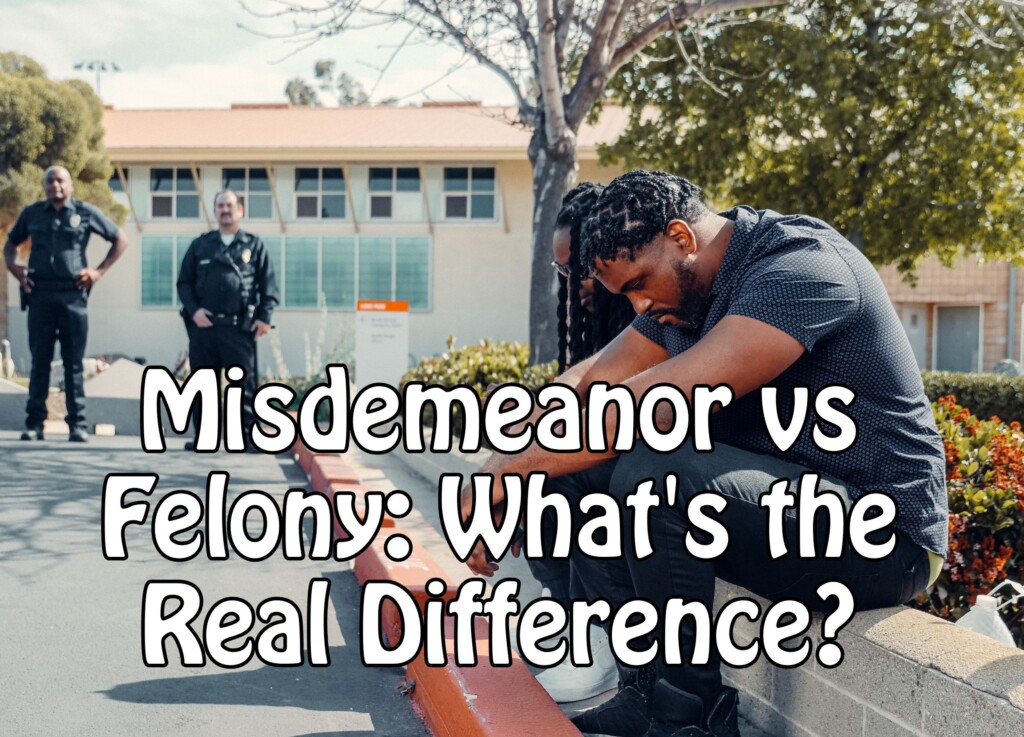Understanding the Basics
When it comes to breaking the law, not all crimes are created equal. In the United States, crimes are generally categorized into two main types: misdemeanors and felonies. Understanding the difference between these two can be crucial, especially if you find yourself in a legal pickle.

Misdemeanors: The Lesser Offense
Misdemeanors are considered less severe crimes. These could include things like petty theft, public intoxication, simple assault, and minor traffic violations like speeding or running a red light. The penalties for misdemeanors are also less severe, usually involving fines, community service, or short-term jail time, often less than a year.
Felonies: The Big-Time Crimes
Felonies are the more serious offenses and come with heftier penalties. We’re talking about crimes like murder, rape, armed robbery, and serious drug offenses. If you’re convicted of a felony, you’re looking at significant jail time, often a year or more, and that’s usually in a state or federal prison, not a local jail. Felonies can also come with other long-term consequences, like losing the right to vote or own a firearm.
Legal Procedures: What to Expect
The legal process for misdemeanors and felonies also differs. For misdemeanors, you might just get a citation and a date to appear in court. For felonies, you’re likely getting arrested on the spot and could face a lengthy trial.
The Gray Area: Wobblers
Some crimes can be considered either a misdemeanor or a felony, depending on the circumstances and the severity of the offense. These are often called “wobblers.” For example, certain types of assault can be considered a misdemeanor if the injury is minor but could be bumped up to a felony if the injury is more serious or if a weapon was involved.
Impact on Your Record
Both misdemeanors and felonies will show up on criminal background checks, but a felony is a much bigger red flag for employers, landlords, or anyone else who might be checking up on you. Some misdemeanors can be expunged, or removed from your record, after a certain period of good behavior. Felonies, on the other hand, are much harder to shake and can affect your life long after you’ve served your time.
The Financial Toll
Fines for misdemeanors are generally lower, often just a few hundred dollars. Felonies can come with fines that reach into the thousands or even tens of thousands. Plus, legal fees for defending against a felony charge can be astronomical.
Know Your Rights
If you’re ever charged with either a misdemeanor or a felony, it’s crucial to know your rights. You have the right to remain silent, and you have the right to an attorney. Even if you think the situation is minor, legal advice can help you navigate the complexities of the legal system.
Understanding the difference between a misdemeanor and a felony can help you grasp the severity of a crime and its potential consequences. Whether you’re just curious or find yourself in a situation where this knowledge is essential, it’s always good to be informed.
Misdemeanor vs Felony: What’s the Real Difference?
When it comes to breaking the law, not all crimes are created equal. In the United States, crimes are generally categorized into two main types: misdemeanors and felonies. While both are offenses that can get you in trouble with the law, they differ in severity, legal repercussions, and long-term consequences. So, what sets a misdemeanor apart from a felony? Let’s dive in and break it down.
What is a Misdemeanor?
A misdemeanor is a less severe criminal offense that usually results in less severe punishments compared to felonies. We’re talking about stuff like petty theft, public intoxication, or minor drug possession. The penalties for misdemeanors typically include fines, probation, community service, or short-term jail time, usually less than a year.
Legal Consequences of a Misdemeanor
If you’re convicted of a misdemeanor, it’s not the end of the world, but it’s still serious business. You might have to pay a fine, do some community service, or even spend a few days in jail. The good news is that a misdemeanor usually doesn’t stick around to haunt you forever. In many states, your criminal record can be expunged, meaning it gets wiped clean after you’ve served your time or paid your fines.
What is a Felony?
Now, a felony is a whole different ball game. Felonies are serious crimes that come with hefty penalties. We’re talking about violent crimes like murder, rape, or armed robbery, but also white-collar crimes like embezzlement or fraud. The punishment for felonies is way harsher and can include long-term imprisonment, hefty fines, or even the death penalty in some states.
Legal Consequences of a Felony
If you’re convicted of a felony, you’re looking at some life-changing consequences. Apart from long-term imprisonment, having a felony on your record can affect your voting rights, your ability to own a firearm, and even your job prospects. Unlike misdemeanors, felonies are usually permanent marks on your criminal record, making it difficult to move on even after you’ve served your time.
Key Differences Between Misdemeanors and Felonies
- Severity of the Crime: Felonies involve more severe actions and therefore come with harsher penalties.
- Jail Time: Misdemeanors might land you in jail for less than a year, while felonies can lead to long-term imprisonment.
- Fines: The financial penalties for felonies are generally much higher than those for misdemeanors.
- Criminal Record: A misdemeanor can often be expunged from your record, while a felony is usually there to stay.
- Civil Rights: Felonies can strip you of certain civil rights, like the right to vote or own a firearm, which is generally not the case with misdemeanors.
Why Knowing the Difference Matters
Understanding the difference between a misdemeanor and a felony is crucial, especially if you find yourself in a legal pickle. Knowing what you’re up against can help you make informed decisions, like whether to plea bargain or go to trial. It can also prepare you for the potential consequences, so you’re not blindsided down the road.
So there you have it, the lowdown on misdemeanors and felonies. While both are serious matters that require legal attention, the scale of the crime and its repercussions are what set them apart. If you ever find yourself facing criminal charges, it’s always a good idea to consult with a legal expert to navigate the complexities of the law.
As an Amazon Associate we earn from qualifying purchases through some links in our articles.




